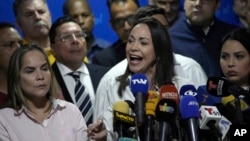As Venezuela's government would have it, President Nicolas Maduro and members of his inner circle have been the target of several conspiracies since last year that could have left them injured or worse.
Few details have been released about the alleged plots. But the government has cited them in the arrests of more than 30 people since January, including a prominent human rights attorney and staffers of the leading opposition presidential candidate.
Local and international nongovernmental groups, the United Nations and foreign governments have described the crackdown as a pretext to stifle political opposition ahead of the July 28 presidential election in which Maduro, in power since 2013, will seek a new six-year term.
The latest arrests took place Wednesday shortly before the country's top prosecutor announced arrest warrants for nine people working with Maria Corina Machado's campaign, whom he accused of participating in one plot.
Oscar Murillo, general coordinator for the Venezuelan human rights group Provea, said officials are coordinating actions of the police, military and civic groups to tamp down any anti-government activity.
"This has translated into greater political repression and a deepening of the policy of persecution that seeks to break civil society at a time when perhaps the ideal thing would be to be talking about the public policies needed to reverse poverty or inequality in Venezuela," Murillo said.
Alleged plots described
Attorney General Tarek William Saab has described the plots as aimed at attacking military installations, killing Maduro and other officials and destabilizing the country. He has publicly presented alleged confessions, planning documents, laptops and other items he has characterized as evidence.
Saab on Wednesday accused the nine members of the opposition, including Machado's campaign manager, of being part of a plot that included demonstrations, a media campaign and plans to attack military barracks. He said two of the nine people, Dignora Hernandez and Henry Alviarez — Machado's political coordinator and national coordinator, respectively — had already been arrested.
The arrests of Hernandez and Alviarez brought to at least six the number of Machado staffers who are in custody over their alleged participation in the plots the government claims to have foiled.
Allowing free-market proponent Machado to run in the July election would offer Venezuela its best chance of a competitive race because no other candidate has anywhere near the level of support, money or political machinery to challenge Maduro. But the self-described socialist government has barred her from office for 15 years — an administrative order upheld by the country's top court in January.
Other members of Venezuela's opposition have urged Machado to stand aside for another contender, but she has insisted on continuing her candidacy, perhaps hoping that international pressure could force Venezuela's establishment to relent on the ban.
She told reporters Wednesday that her campaign continues organizing across the country and expects "much more than just well wishes" from the international community.
Machado also defended her staff, stressing that all allegations against them are false.
Charging documents unavailable
The government has not made public any charging documents detailing allegations against the dozens of defendants in the conspiracy cases. Under Venezuelan law, court hearings are open, but in practice, journalists and sometimes even the defendants' counsels of choice are barred from the courtroom.
Wednesday's detentions came hours after an independent panel of experts investigating human rights violations in Venezuela told the U.N. Human Rights Council in Geneva that Maduro's government had increased repression efforts against real or perceived opponents ahead of the election.
"The mission confirms that, as has happened in the past, the authorities invoke real or fictitious conspiracies to intimidate, detain and prosecute people who oppose or criticize the government," panel head Marta Valinas told the council, which authorized the investigative mission. "At the same time, the attorney general's office continues to operate as part of the government's repressive machinery to grant the appearance of legality to the persecution of critical voices."
Maduro became interim president in March 2013 after the death of charismatic leader Hugo Chavez. He narrowly won election weeks later and was re-elected in 2018 in an electoral process widely criticized as fraudulent.
The latest wave of arrests threatens to unravel a political accord negotiated last year among the U.S. government, the opposition faction it backs and Maduro.
The October agreement focused on conditions for a free and fair election and earned Maduro some relief from U.S. economic sanctions on the country's oil, gas and mining sectors. But hopes for a more level playing field began fading shortly afterward, and the U.S. has reversed the relief on the gold-mining industry because of what it considers Maduro's noncompliance.




